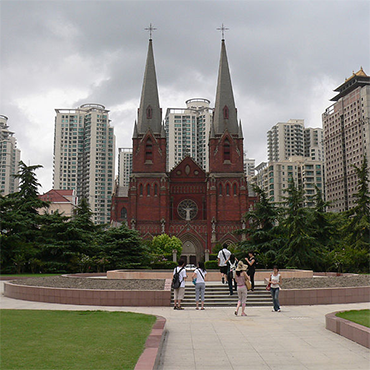Christianity grows in China
Steve Kelman finds that millions of Christians in China belong to state-recognized Christian churches, while unofficial Christian churches live a sometimes-tolerated, sometimes-persecuted existence.

St. Ignatius Cathedral in Shanghai, China. (Photo from Wikimedia)
There was a fascinating article – in of all places China Daily, the closest one comes to an "official" English-language newspaper in China – about the leader of the officially sanctioned Protestant churches in China calling for tailoring sermons for Chinese Christians based on their various personal backgrounds.
Traditionally, many Christians in China, as in other Asian countries, have been highly educated, Westernized people, and Christians have often been associated with movements for political democratization and educational enlightenment. However, the article points out that in recent years, many new converts to Christianity in China have been underprivileged and often poorly educated migrant workers in big Chinese cities. According to one religious leader quoted in the article, the traditional Christians "go to church mostly for 'a lofty spiritual need,' [while] migrant workers are seeking advice and comfort on everyday difficulties of life. … [They] are under great pressure, and they especially lack family warmth and help."
Another religious leader stated that these workers "consider themselves at the bottom of society… [and] are treated as outcasts." So Chinese Christians are thinking about how to minister to this new community of believers. But, the article says, the church needs to find a new way to relate to them.
I found this article fascinating not only for its content but for the fact that this newspaper was interested in discussing internal issues of how Christians could be most effective.
Christianity is certainly something of a presence in China. One occasionally comes upon young people wearing crosses (although those wearing t-shirts with American flags are more common). Millions of Christians are part of the state-recognized churches, and there are also unofficial Christian churches that live a sometimes-tolerated, sometimes-persecuted existence.
While in Shanghai, I visited the Shanghai Catholic Cathedral (St. Ignatius Church), built in 1904, along with some other Catholic-related buildings. It sits in an area outside the center of town now dominated by some of the city's most gargantuan shopping malls. There were about 200 people at a late Sunday-afternoon mass, almost all Chinese (though a few Westerners), about 80 percent women and about 70 percent young or fairly young. It was a strange experience to see Chinese Christians entering the church, taking holy water, and crossing themselves.
P.S. My flight from China arrived back on the evening (U.S. time) of Mid-Autumn Moon Festival, a major holiday in Chinese culture that features people eating something called "mooncakes," jelly and/or whole cooked egg yolk-filled round sweets. The customs inspection people were ready, because mooncakes with whole egg yolks can apparently not be brought into the United States because of bird flu fears. Along with others on the China flight, I was whisked off to secondary inspection, and the various boxes with mooncake gifts I had received checked out for egg yolks. Three of my gifts survived (jelly only) but one didn't. A big waste bin included lots of mooncake boxes and tins.
NEXT STORY: 16 hot companies to watch





